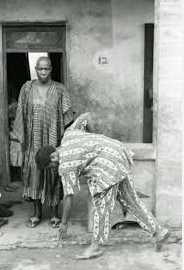
support@yorubalibrary.com
+2348073529208, 07038599574

Greetings are one of the most important parts of Yoruba culture. They are not just a way to say hello—they show respect, kindness, and recognition of time and place. In Yoruba society, people greet elders, family members, neighbors, and even strangers with the correct words depending on the time of day.
For Yoruba learners, understanding how to greet properly in the morning, afternoon, and night is a great way to mingle with speakers and show cultural respect. Even if you're learning from abroad or raising children in the diaspora, these greetings are simple to use and very powerful in daily conversation.
This guide breaks down the most common Yoruba greetings for different times of day and explains how to use them in a respectful and clear way.
Morning Greeting
Greeting: Ẹ káàárọ̀
Meaning: Good morning
• Pronunciation: Eh-kah-ah-raw
• Used from dawn until around 11am
• Add “ẹ” to show respect, especially to elders
Example:
– Ẹ káàárọ̀ sir (Good morning sir)
– E Káàárọ̀ o, bàbá (Good morning, father)
Afternoon Greeting
Greeting: Ẹ káàsán
Meaning: Good afternoon
• Pronunciation: Eh-kah-ah-sawn
• Used from around 12pm to 3:00pm
• Still includes the respectful “ẹ” when needed
Example:
– Ẹ káàsán, má (Good afternoon, ma)
– Káàsán o, àbúrò mi (Good afternoon, my younger one)
Evening or Night Greeting
Greeting: Ẹ káalẹ́
Meaning: Good evening (used from 6pm onward)
• Pronunciation: Eh-kah-ah-leh
• Suitable for evening conversations, not for bedtime
• For bedtime, Yoruba speakers often say Ó dárọ̀ (Good night / Sleep well)
Example:
– Ẹ káalẹ́, Anty Rónké (Good evening, Aunty Ronke)
– E Káalẹ́ o, bàbá mi (Good evening, my father)
Notes on Respect
In Yoruba, “Ẹ” at the beginning of a greeting is a respectful prefix. Use it for older people, strangers, or in formal settings. With people close to your age or younger, you may hear the greeting without “ẹ” (e.g., Káàárọ̀ o).
Also, Yoruba greetings often include body language. For men, a light bow or kneel; for women, a gentle kneel or curtsy when greeting elders.
Other Useful Greetings
• Ó dìgbà – Till next time
• Ó dábọ̀ – Goodbye
• Ó dárọ̀ – Good night (before sleep)
• Ẹ kú ọjọ́ méta – Welcome back after some days
• Ẹ kú ìrìn àjò – Well done for traveling (safe journey return)
Conclusion
Greeting the right way in Yoruba is a sign of good upbringing and strong values. Morning, afternoon, and night greetings are simple to learn and make a big impact in everyday conversation. E seun o.

Learn about the Yoruba concept of Ìwà Pẹ̀lẹ́ (good…

Learn special praises for Divine Being and Creator…